校园口语第二课-Select courses
校园口语汇总(问候、上课、点名、游戏、活动、鼓励)
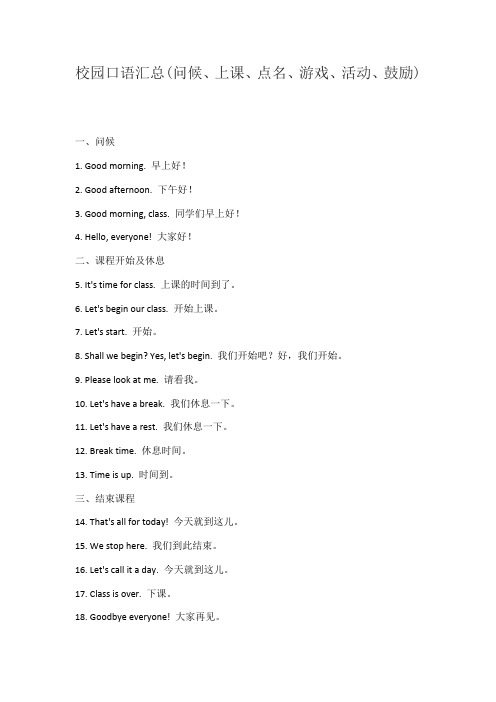
一、问候
1. Good morning. 早上好!
2. Good afternoon. 下午好!
3. Good morning, class. 同学们早上好!
4. Hello, everyone! 大家好!
二、课程开始及休息
5. It's time for class. 上课的时间到了。
81. Close your eyes. 闭上眼睛。
82. Open your eyes. 睁开眼睛。
83. Read after me, please. 请跟我读。
84. Open your books and turn to page___. 打开书,翻到第____页。
75. Wave your arms. 摆臂。
76. Show me your left hand. 让我看看你的左手。
77. Stretch your legs. 伸伸腿。
78. Stretch your arms. 伸伸胳膊。
79. Nod your head. 点点头。
80. Shake your head. 摇摇头。
33. Come in, please. 请进。
五、游戏及活动用语
34. Let's play a game. 我们玩游戏吧。
35. Let's begin./ start. 我们开始。
36. Are you ready? 准备好了吗?
37. One, two, three, go! 一、二、三,开始!
四、点名
24. Is everyone here? 每个人都在吗?
25. When teacher calls your name, please stand up and say "Here." 老师叫到你的名字,请站起来说“到”。
选修课的英文作文
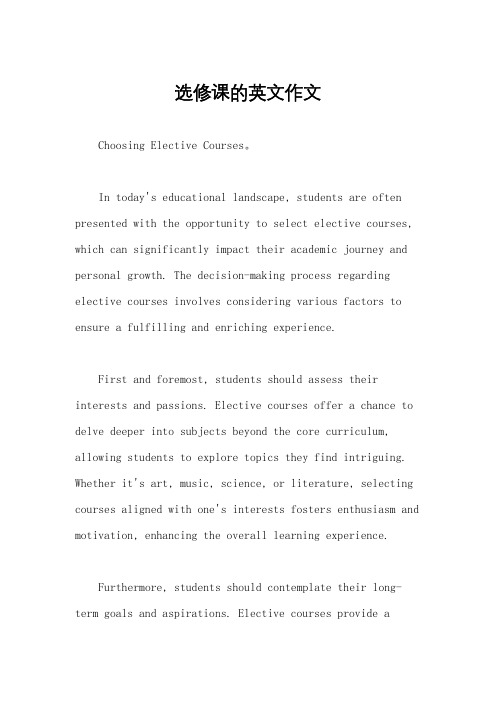
选修课的英文作文Choosing Elective Courses。
In today's educational landscape, students are often presented with the opportunity to select elective courses, which can significantly impact their academic journey and personal growth. The decision-making process regarding elective courses involves considering various factors to ensure a fulfilling and enriching experience.First and foremost, students should assess their interests and passions. Elective courses offer a chance to delve deeper into subjects beyond the core curriculum, allowing students to explore topics they find intriguing. Whether it's art, music, science, or literature, selecting courses aligned with one's interests fosters enthusiasm and motivation, enhancing the overall learning experience.Furthermore, students should contemplate their long-term goals and aspirations. Elective courses provide aplatform for developing valuable skills and knowledge that may not be covered in mandatory classes but are essential for personal and professional development. For instance, a student aspiring to pursue a career in technology might opt for programming or web development courses, while someone interested in environmental conservation might choose courses related to sustainability or ecology.Another crucial aspect to consider is the relevance of elective courses to one's academic or career path. Selecting courses that complement one's major or intended field of study can provide a competitive edge and broaden one's understanding of the subject matter. Additionally, interdisciplinary electives offer a unique opportunity to explore connections between different disciplines,fostering a holistic approach to learning.Moreover, students should seek guidance from academic advisors, mentors, or peers when making elective course selections. These individuals can offer valuable insights, recommend relevant courses, and provide support throughout the decision-making process. Additionally, consultingcourse catalogs, syllabi, and professor reviews can help students make informed choices based on course content, teaching style, and workload.It's also essential for students to consider the practical implications of elective courses, such as scheduling conflicts, workload management, and prerequisites. Balancing academic requirements with extracurricular activities, part-time jobs, or other commitments is crucial for maintaining a healthy andfulfilling lifestyle.Furthermore, students should embrace diversity and inclusivity when choosing elective courses. Exploring courses that offer perspectives from different cultures, backgrounds, and experiences fosters empathy, understanding, and appreciation for diversity in today's interconnected world.In conclusion, selecting elective courses is asignificant decision that requires careful consideration of one's interests, goals, and academic requirements. Bythoughtfully evaluating available options, seeking guidance from mentors, and embracing diverse perspectives, students can make informed choices that enrich their educational experience and pave the way for future success.。
全新版大学听说教程3答案第二版
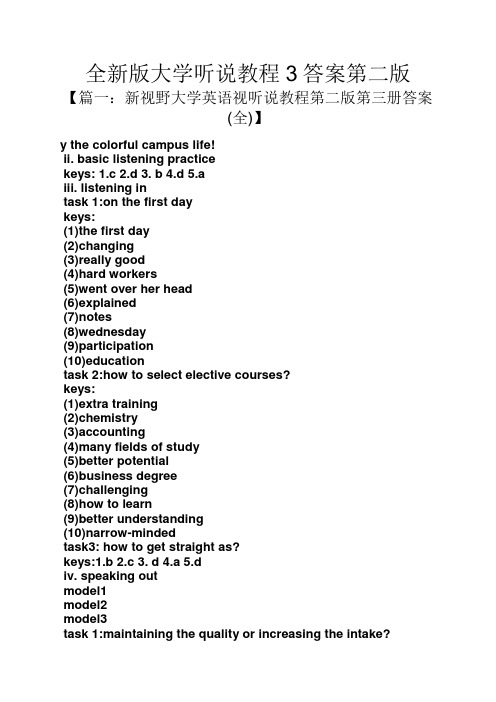
全新版大学听说教程3答案第二版【篇一:新视野大学英语视听说教程第二版第三册答案(全)】y the colorful campus life!ii. basic listening practicekeys: 1.c 2.d 3. b 4.d 5.aiii. listening intask 1:on the first daykeys:(1)the first day(2)changing(3)really good(4)hard workers(5)went over her head(6)explained(7)notes(8)wednesday(9)participation(10)educationtask 2:how to select elective courses?keys:(1)extra training(2)chemistry(3)accounting(4)many fields of study(5)better potential(6)business degree(7)challenging(8)how to learn(9)better understanding(10)narrow-mindedtask3: how to get straight as?keys:1.b 2.c 3. d 4.a 5.div. speaking outmodel1model2model3task 1:maintaining the quality or increasing the intake?keys:(1)quality(2)young(3)25(4)difficult(5)government(6)quality(7)cut(8)extra-cautious(9)afford(10)experience(11)more(12)blame(13)budget(14)puzzled(15)servicetask 2:whats your answer?according to the interviewee,its difficult to strike a balance between maintaining the educational quality and making sure as many people as possible receive university education.in the past years, china has been confronted with the same problem.the university eollment has been on the increase and some institutions of higher learning do not have enough teachers and teaching facilities,thus affecting the educational quality.task 3:lets group work!vi. further listening and speakinglistening task:task1: problems with our educational systemscript:hi, everybody. my topic today is problems with our educational system.i disagree on a lot of the ways that things have happened for a long time in our educational system.it seems that educators just want to give standardized tests,which focus only on academic performance and neglect students abilities and interest in other areas.i think there are a lot of people who are very intelligent,but havent had the opportunities they could have had if they had learned in a broader-minded educational system.i feel that a lot of courses that students are required to take in high school are too academic, and, as a result,many kids have lost their interest in cators often fail to recognize various kinds of intelligence.they simply exert a lot of pressure on students to be as well-rounded as possible. i think being well-rounded isnt really possible.and as a consequence, some students i believe to be intelligent cant get into good colleges if they,you know, havent scored well on the math section, even if they are brilliant writers. another thing that disturbs me is that the so-called weak students are separatedfrom the rest of the school.some kids are kept in a separate class if their grades are lower than others. and theyre very aware of their social position, you know.i think it causes them to act in a way that is not really positive. theyre just acting in a way they are expected. often their grades go from bad to worse. and thats pretty sad.i think that many of the kids in those classes are intelligent,but they never actually realize their potential because of the way they are treated early on in their education.keys:(1)standardized tests(2)abilities and interest(3)interest(4)pressure(5)well-rounded(6)get into good colleges(7)the rest of the school(8)from bad to worsetask 2: the final examscriptat a university, there were four sophomores taking a chemistry course.they were doing so well on all the quizzes, midterms, labs, etc. that each had an a so far for the semester.these four friends were so confident that on the weekend before the final, they decided to go up to the university of virginia and party with some friends there.they decided to find their professor after the final and explain to him why they missed it.they explained that they had planned to come back in time for the final exam, but, unfortunately, they had a flat tire on the way back and didnt have a spare. as a result, they missed the final.the professor thought it over and then agreed they could make up the final the following day.the guys were relieved and elated.the next day, the professor placed them in separate rooms, handed each of them a paper, and told them to begin.they looked at the first problem, worth five points.it was a simple question on a chemical reaction.cool, they all thought at the same time, each one in his separate room, this is going to be easy.each finished the problem and then turned the page.on the second page was a question worth 95 points: which of the tires was flat?keys:(1)course(2)quizzes(3)semester(4)confident(5)party(6)make(7)missed(8)they had a flat tire on the way back and didnt have a spare(9)placed them in separate rooms, handed each of them a paper(10)on the second page was a question worthtask3: harvard universityscriptharvard university is the oldest institute of higher learning in the united states. founded 16 years after the arrival of the pilgrims at plymouth,the university has grown from nine students with a single master to the present eollment of more than 21,000 students,including undergraduates and students in 10 graduate and professional schools. over 14,000 people work at harvard, including more than 2,100 faculty members. harvard has produced eight american presidents and many nobel prize winners. during its early years, harvard offered a classic academic course based on the model of english universities,but consistent with the prevailing puritan philosophy.although many of its early graduates became ministers in puritan churches throughout new england,the university was never formally affiliated with a specific religious group.under president pusey, harvard started what was then the largest fundraising campaign in the history of american higher education.it was an 82.5-million-dollar program for the university.the program increased faculty salaries, broadened student aid, created new professorships,and expanded harvards physical facilities.neii l. rudenstine took office as harvards 26th president in 1991.as part of an overall effort to achieve greater coordination among the universitys schools and faculties,rudenstine encouraged academic planning and identified some of harvards main intellectual priorities.he also stressed the importance of the universitys excellence in undergraduate education,the significance of keeping harvards doors open to students from families of different economic backgrounds,and the task of adapting the research university to an era of both rapid information growth and serious fund shortage.keys: 1.b 2.a 3. c 4.d 5.dviewing and speaking:task 1:university budget cutsscripthost: well, david lammy, the university minister, joins me from westminster. now thanks for joining us this lunchtime,mr. lammy. how do these cuts... tie in with your much trumpeted commitment to increasing higher education?interviewee: well, i think its important to remind viewers that we will spend well over 12 billion pounds on higher educationthis year and to also say that there will be more students at university next year than ever before in our history.but what is important is that when they get to university, is that they have good facilities, good buildings,that they have good contact with their lecturers and, for students from poorer backgrounds that they receive a grant.and you know 40 percent of students who are going to university are in receipt of some grants. so we have to plan...host:but theres going to be less money next year. thats the bottom line, isnt it? interviewee: er, we are asking universities to make a one percent cut in their teaching grant.thats 51 million out of a total budget of over five billion.look, i think there are families across the country preparing for christmas spending a bit less and theyre,you know, its a lot more than one percent that theyre, theyre feeling.so i think this is reasonable to ask universities if we are to ensure that we cancontinue to send more young people to university and we remain committed to that. host:and briefly, what about these two-year degrees? this is a reduction in standards, isnt it?interviewee:well, we, we, we... its important in this country that we remember that students arent just the classic 18- to 21-year-old undergraduates.we want mature students. we want more parttime students and over the last few years weve been growing the number of foundation degree,two-year degrees that ensure that transition into high university and high level skills. thats what we want to support and thats what were indicating in the grant letter that weve sent to universities over the last few days.host:ok. david lammy, thank you so much for joining us.interviewee:thank you.keys:(1)increasing(2)12 / twelve(3)more(4)facilities(5)lecturers(6)poorer(7)grant【篇二:全新版大学英语(第二版)综合教程3课后详细答案+新世纪视听说教程3(第二版)答案】ivetext acontent questions ( p10 )1. write and live on a farm.2. because they grow nearly all of their fruits and vegetables. they have enough eggs, honey andwood. they are very close to nature and can enjoy the beautiful scenery. besides, they can go skiing and skating in winter.3. no. sometimes the good life can get pretty tough.4. they were buried under five feet of snow from december through march.5. when the first spring came, it brought two floods. the second flood refers to the good harvestin the growing season.6. he decided to quit his job and start to freelance.7. he has to crawl into black bear dens for “sports illustrated”, hitch up dogsled racing teams for“smithsonian” magazine, c8. heck out the lake champlain “monster” for “science digest”, and canoe through the boundarywaters wilderness area of minnesota for “destinations”.9. as for insurance, they have only bought a poor man’smajor-medical policy and the policy ontheir two cars.10. they cut back their expenses without appreciably lowering their standard of living. forexample, they patronize local restaurants instead of more expensive places in the city. they still attend the opera and ballet but only a few times a year. they eat less meat, drink cheaper wine and see fewer movies.11. a tolerance for solitude and lots of energy.12. they will leave with a feeling of sorrow but also with a sense of pride at what they have beenable to accomplish.13. they chose to live in the country because they want to improve the quality of their lives. yes,they have finally realized their dreams.text organization ( p11 )part one (paragraphs 1—3) the writer views his life in the country as a self-reliant and satisfyingone.part two(paragraphs 4—7 ) life in the country is good yet sometimes very hard.part three (paragraphs 8—11) after quitting his job, the writer’s income was reduced, but he andhis family were able to manage to get by.part four (paragraphs 12—15 ) a tolerance for solitude and a lot of energy have made it possiblefor the family to enjoy their life in the country.happy moments and events1) growing nearly all their fruits and vegetables2) canoeing, picnicking, long bicycle rides, etc.3) keeping warm inside the house in winter4) writing freelance articles5) earning enough money while maintaining a happy family life hardships1) working hard both in winter and in summer2) harsh environment and weather condition3) anxious moments after the writer quit his job4) cutting back on daily expenses5) solitudevocabulary1. fill in the gaps with words or phrases given in the box.( p15 )1) on balance 2) resist 3) haul 4) wicked5) illustrated6) budget 7) lowering 8) boundary9) involved10)economic 11) blasting 12) just about2. now use the verb in brackets to form an appropriate phrasal verb you have learned and complete the sentence with it.( p16 )1) cut back / down 2)pick up3)get by 4) get through5)face up to 6)turn in7)making up for8)think up3. rewrite each sentence with the word or phrase in brackets, keeping the same meaning. (p17 )1) pursued his mathematical studies and taught himself astronomy.2) often generate misleading thoughts.3) attach great importance to combining theory with practice in our work.4) be suspected of doing everything for money.5) before he gets through life.4. complete the sentences, using the words or phrases in brackets ( p17 )1. their indoor a profit to invest in2. devicethe improvement on a global scale3. stacked temptationnever dined outconfusable use ( p18 )1. house2. home3. home family4. household1. doubt2. suspected3. doubted4. suspected5. suspectword formation ( p19 )1) rise2) final 3) regular 4) cash5) hows and whys6) upped 7) yellowed 8) bottled 9) lower 10) searchcloze1. text-related ( p20 )1) gets by 2) temptation 3) get through4) improvement 5) aside from6) suspect7) supplement8) profit9) stacking2. theme-related( p21 )1) replaced2) consider 3) quit4) world5) tough6) fuels7) provide 8) luxuries 9) balance10) idealtranslation1. translate the sentences into english( p21 )1) we have a problem with the computer system, but i think it is fairly minor.2) my father died when i was too young to live on my own. the people of my hometowntook over responsibility for my upbringing at that point.3) the toys have to meet strict safety requirements before they can be sold to children.4) radio and television have supplemented rather than replaced the newspaper as carriers ofnew and opinion.5) when it comes to this magazine, it is a digest of articles from many newspapers andmagazines around the world.2. translate the passage into english ( p21 )a decade ago, nancy did what so many americans dream about. she quit an executive position and opened a household device store in her neighborhood. people like nancy made the decision primarily for the improvement in the quality of their lives.but, to run a business on a small scale is by no means an easy job. without her steady income, nancy had to cut back on her daily expenses. sometimes she did not even have the money to pay the premiums for the various kinds of insurance she needed.fortunately, through her own hard work, she has now got through the most difficult time. she is determined to continue pursuing her vision of a better life.text b1. choose the best answer for each of the following. ( p27 )1—6.a c d b a ctranslate into chinese the underlined sentences in the essay ( p28 )1. 什么?你说那听起来不像你府上的生活?其实,不仅仅是你一个人这么想。
选择什么选修课英语小作文

选择什么选修课英语小作文Title: Choosing Elective Courses。
In the modern education system, students are often presented with the opportunity to select elective courses, which can significantly shape their academic journey and future prospects. The decision regarding which elective courses to choose is crucial, as it can influence various aspects of one's personal and professional development. In this essay, we will explore the factors to consider when selecting elective courses and discuss the benefits of making informed choices.First and foremost, students should consider their interests and passions when choosing elective courses. Selecting courses that align with one's interests not only makes learning more enjoyable but also increases the likelihood of academic success. When students are genuinely interested in a subject, they are more likely to actively engage with the material, participate in discussions, andpursue additional research opportunities. As a result, they can develop a deeper understanding of the subject matter and acquire valuable skills that can be applied in various contexts.Moreover, students should consider the relevance of elective courses to their academic and career goals. Some elective courses may complement their major field of study, providing them with additional knowledge and skills that enhance their professional prospects. For example, a computer science major may choose to take elective courses in artificial intelligence or cybersecurity to broadentheir skill set and increase their employability in the tech industry. Similarly, a business student may opt for elective courses in marketing or finance to gain specialized knowledge that aligns with their career aspirations.Furthermore, students should explore the practical implications of elective courses. Some courses may offer hands-on experience, internships, or opportunities forreal-world application, which can significantly enhancelearning outcomes and prepare students for future challenges. For instance, a photography elective mayinclude field trips, studio sessions, and assignments that allow students to develop their technical skills andartistic vision under the guidance of experienced professionals. Similarly, a volunteerism elective mayinvolve community service projects that enable students to make a positive impact while gaining valuable insights into social issues.Additionally, students should consider the flexibility and adaptability of elective courses. In today's rapidly changing world, it is essential to acquire versatile skills that can be applied across different industries and contexts. Elective courses that foster creativity, critical thinking, problem-solving, and adaptability can equip students with the tools they need to navigate complex challenges and seize opportunities in a dynamic environment. Therefore, students should prioritize courses that encourage innovation, collaboration, and interdisciplinary thinking, as these skills are highly valued in the 21st-century workforce.In conclusion, the process of choosing elective courses requires careful consideration of various factors,including interests, relevance, practical implications, and adaptability. By making informed choices, students can maximize their learning potential, expand their horizons, and prepare themselves for success in their academic and professional endeavors. Ultimately, elective courses offer a valuable opportunity for students to explore new interests, develop specialized skills, and chart their own path towards a fulfilling and rewarding future.。
关于大学生活的雅思part2口语模板
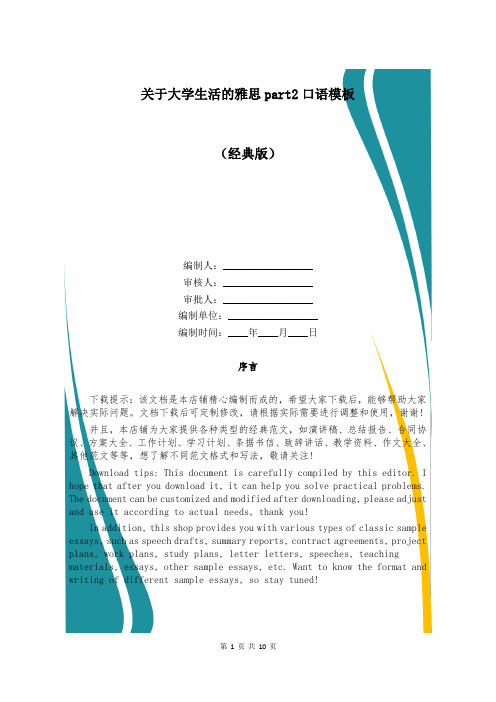
关于大学生活的雅思part2口语模板(经典版)编制人:__________________审核人:__________________审批人:__________________编制单位:__________________编制时间:____年____月____日序言下载提示:该文档是本店铺精心编制而成的,希望大家下载后,能够帮助大家解决实际问题。
文档下载后可定制修改,请根据实际需要进行调整和使用,谢谢!并且,本店铺为大家提供各种类型的经典范文,如演讲稿、总结报告、合同协议、方案大全、工作计划、学习计划、条据书信、致辞讲话、教学资料、作文大全、其他范文等等,想了解不同范文格式和写法,敬请关注!Download tips: This document is carefully compiled by this editor. I hope that after you download it, it can help you solve practical problems. The document can be customized and modified after downloading, please adjust and use it according to actual needs, thank you!In addition, this shop provides you with various types of classic sample essays, such as speech drafts, summary reports, contract agreements, project plans, work plans, study plans, letter letters, speeches, teaching materials, essays, other sample essays, etc. Want to know the format and writing of different sample essays, so stay tuned!关于大学生活的雅思part2口语模板为了让大家高效备考雅思口语,积累更多素材,下面本店铺就给大家分享一下关于大学生活的雅思part2口语模板,希望大家喜欢。
校园英语口语:Arrival 入学报到啦
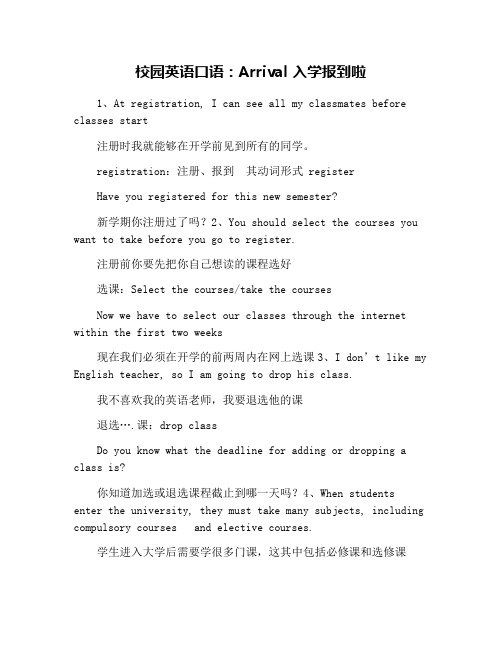
校园英语口语:Arrival 入学报到啦1、At registration, I can see all my classmates before classes start注册时我就能够在开学前见到所有的同学。
registration:注册、报到其动词形式 registerHave you registered for this new semester?新学期你注册过了吗?2、You should select the courses you want to take before you go to register.注册前你要先把你自己想读的课程选好选课:Select the courses/take the coursesNow we have to select our classes through the internet within the first two weeks现在我们必须在开学的前两周内在网上选课3、I don’t like my English teacher, so I am going to drop his class.我不喜欢我的英语老师,我要退选他的课退选….课:drop classDo you know what the deadline for adding or dropping a class is?你知道加选或退选课程截止到哪一天吗?4、When studentsenter the university, they must take many subjects, including compulsory courses and elective courses.学生进入大学后需要学很多门课,这其中包括必修课和选修课选修课:elective courses 必修课compulsory courses5、Excuse me, can you tell me which desk is for the freshman’s registration?打扰了,我想问一下大一新生注册的地方在哪里?freshman 大一 sophomore 大二 junior 大三 senior 大四When I was a sophomore, I took part in the secretary department of student union.我在大二的时候参加了校学生会的秘书部。
讨论大学校园生活的英语口语
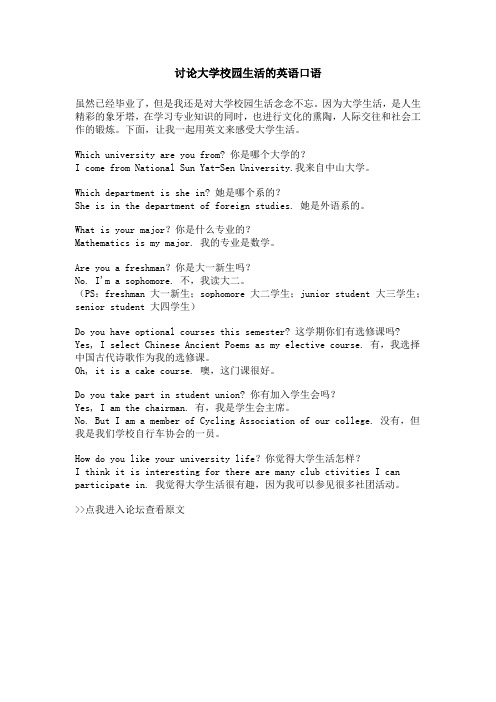
讨论大学校园生活的英语口语虽然已经毕业了,但是我还是对大学校园生活念念不忘。
因为大学生活,是人生精彩的象牙塔,在学习专业知识的同时,也进行文化的熏陶,人际交往和社会工作的锻炼。
下面,让我一起用英文来感受大学生活。
Which university are you from? 你是哪个大学的?I come from National Sun Yat-Sen University.我来自中山大学。
Which department is she in? 她是哪个系的?She is in the department of foreign studies. 她是外语系的。
What is your major?你是什么专业的?Mathematics is my major. 我的专业是数学。
Are you a freshman?你是大一新生吗?No. I'm a sophomore. 不,我读大二。
(PS:freshman 大一新生;sophomore 大二学生;junior student 大三学生;senior student 大四学生)Do you have optional courses this semester? 这学期你们有选修课吗? Yes, I select Chinese Ancient Poems as my elective course. 有,我选择中国古代诗歌作为我的选修课。
Oh, it is a cake course. 噢,这门课很好。
Do you take part in student union? 你有加入学生会吗?Yes, I am the chairman. 有,我是学生会主席。
No. But I am a member of Cycling Association of our college. 没有,但我是我们学校自行车协会的一员。
How do you like your university life?你觉得大学生活怎样?I think it is interesting for there are many club ctivities I can participate in. 我觉得大学生活很有趣,因为我可以参见很多社团活动。
每天一起练口语(131)----校园生活

School & College 1) Their son will start college in September. 他们的⼉⼦将于九⽉份开始上⼤学。
2) What courses will you be taking this semester? 你本学期打算修什么科⽬? * semester 是指⼀年⼆学期制下的“学期”。
3) There are three terms in a school year. ⼀学年有三个学期。
* 西⽅的教育体系和我们的有所不同。
term 是指⼀年三学期制下的“学期”。
4) I still have to fill 16 hours in my major. 我必须重修主修科⽬16⼩时。
5) Besides the required courses, I'm taking an elective in the Lab Science. 除必修科⽬外,选修科⽬我选了实验科学。
* required courses 是“必修科⽬”,elective 是“选修科⽬”。
Lab 是 laboratory(实验室)的缩写。
6) For my math requirements, I'll be taking algebra, calculus, and trig. 数学的必修学分预定选代数、微积分、三⾓法。
* trig = trigonometry 三⾓法,trig 是学⽣⽤语。
7) The prerequisite for Chinese Lit is Freshman Lit and Comp. 若要从事中国⽂学,必须在⼀年级修⽂学与作⽂。
* Lit = literature Comp = composition freshman 是⼤学⼀年级的学⽣。
8) Three times a week I have to walk all the way to the gym for my Phys Ed class. ⼀周有三次,我为了参加体育课⽽必须⾛路到体育馆。
大学生选修课程的意见英文作文
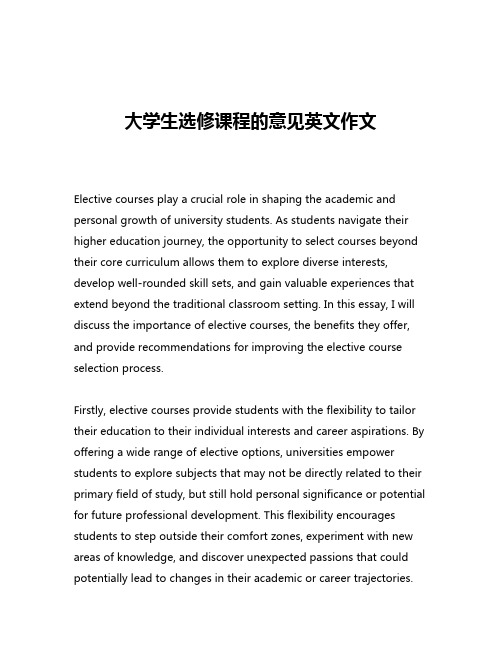
大学生选修课程的意见英文作文Elective courses play a crucial role in shaping the academic and personal growth of university students. As students navigate their higher education journey, the opportunity to select courses beyond their core curriculum allows them to explore diverse interests, develop well-rounded skill sets, and gain valuable experiences that extend beyond the traditional classroom setting. In this essay, I will discuss the importance of elective courses, the benefits they offer, and provide recommendations for improving the elective course selection process.Firstly, elective courses provide students with the flexibility to tailor their education to their individual interests and career aspirations. By offering a wide range of elective options, universities empower students to explore subjects that may not be directly related to their primary field of study, but still hold personal significance or potential for future professional development. This flexibility encourages students to step outside their comfort zones, experiment with new areas of knowledge, and discover unexpected passions that could potentially lead to changes in their academic or career trajectories.Moreover, elective courses often expose students to interdisciplinary perspectives, fostering critical thinking and problem-solving skills that are highly valued in today's dynamic job market. When students engage with coursework that bridges multiple disciplines, they develop the ability to analyze complex issues from diverse angles, synthesize information, and apply innovative solutions. These transferable skills are not only beneficial for academic success but also essential for thriving in a rapidly evolving global economy that demands adaptability and creativity.In addition to intellectual growth, elective courses can also contribute to the personal development of university students. Through participation in elective classes, students have the opportunity to engage with peers from different backgrounds, cultures, and experiences. This exposure to diverse perspectives can challenge students' preconceptions, encourage empathy, and promote a greater understanding of the world around them. Furthermore, elective courses often provide avenues for students to explore extracurricular interests, such as the arts, sports, or community service, which can cultivate valuable life skills, such as time management, teamwork, and social responsibility.However, despite the clear benefits of elective courses, the selection process can sometimes be a source of frustration for students. Onecommon challenge is the limited availability of certain elective courses, which can lead to scheduling conflicts or long waitlists. Universities should strive to offer a diverse range of elective options that cater to the diverse interests and needs of their student population, while also ensuring that the course enrollment process is efficient and transparent.Another concern is the lack of guidance and advising for students navigating the elective course selection process. Many universities could improve their support systems by providing more comprehensive academic advising, where students can receive personalized guidance on how to align their elective choices with their academic and career goals. This could involve the creation of specialized advising programs or the expansion of existing resources, such as career centers and faculty mentorship opportunities.Furthermore, universities should consider incorporating more flexibility into the elective course structure, allowing students to explore interdisciplinary connections or pursue minors or concentrations outside of their primary field of study. This could involve the development of interdisciplinary elective modules or the implementation of more flexible degree requirements that encourage students to venture beyond the confines of their major.In conclusion, elective courses play a vital role in the holisticdevelopment of university students. By providing opportunities for intellectual exploration, personal growth, and the acquisition of transferable skills, elective courses contribute to the overall success and well-being of students. To maximize the benefits of elective courses, universities should strive to offer a diverse range of options, improve the selection and advising process, and foster a culture that encourages students to embrace the transformative potential of their educational journey. By doing so, universities can empower their students to become well-rounded, adaptable, and engaged global citizens, ready to tackle the challenges of the 21st century.。
(完整版)新视野大学英语视听说第二版第三册原文+答案
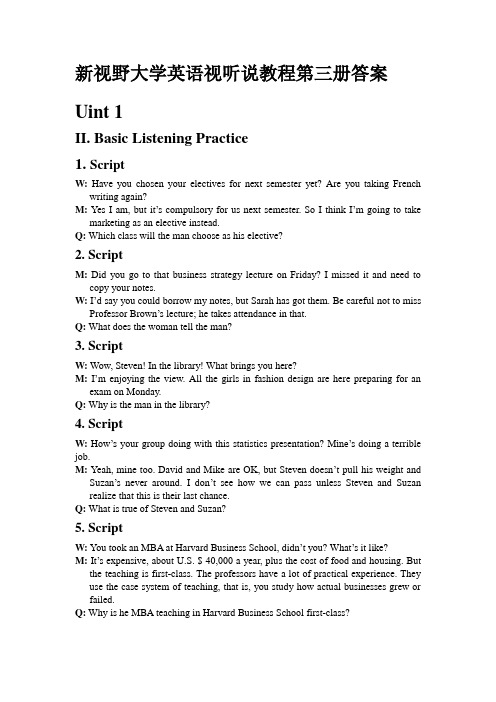
新视野大学英语视听说教程第三册答案Uint 1II. Basic Listening Practice1. ScriptW: Have you chosen your electives for next semester yet? Are you taking French writing again?M: Yes I am, but it’s compulsory for us next semester. So I think I’m going to take marketing as an elective instead.Q: Which class will the man choose as his elective?2. ScriptM: Did you go to that business strategy lecture on Friday? I missed it and need to copy your notes.W: I’d say you could borrow my notes, but Sarah has got them. Be careful not to miss Professor Brown’s lecture; he takes attendance in that.Q: What does the woman tell the man?3. ScriptW: Wow, Steven! In the library! What brings you here?M: I’m enjoying the view. All the girls in fashion design are here preparing for an exam on Monday.Q: Why is the man in the library?4. ScriptW: How’s your group doing with this statistics presentation? Mine’s doing a terrible job.M: Yeah, mine too. David and Mike are OK, but Steven doesn’t pull his weight and Suzan’s never around. I don’t see how we can pass unless Steven and Suzan realize that this is their last chance.Q: What is true of Steven and Suzan?5. ScriptW: You took an MBA at Harvard Business School, didn’t you? What’s it like?M: It’s expensive, about U.S. $ 40,000 a year, plus the cost of food and housing. But the teaching is first-class. The professors have a lot of practical experience. They use the case system of teaching, that is, you study how actual businesses grew or failed.Q: Why is he MBA teaching in Harvard Business School first-class?Keys: 1.C 2.D 3.B 4.D 5.AIII. Listening InTask 2: How to select elective courses?ScriptConsider these tips on elective courses and you 'll choose those that will serve you best.To begin with, you should select the courses that fit your profession. It is a good idea to choose elective courses closely related to your chosen profession. Potential employers will appreciate every bit of extra training and knowledge that they don't have to give you. For example, you may select elective courses in chemistry, biology or even physics if you are doing a science major. For business majors, select electives in accounting, business administration, and even computing, as you will never know when these will come in handy in the corporate world.Moreover, you can choose an education that includes many fields of study. If you are taking a heavy load of career-related courses, you may prefer electives that are not directly related to your major. If you receive a well-rounded education, some employers believe that you have better potential. For example, if you have courses in science along with your business degree, you could possibly win a job over someone who majored purely in business with no outside electives.Finally, you can also select a challenging elective course. Part of getting an education is learning how to learn, and elective courses should help you achieve this goal. You need not to memorize all the information from each class, but you should get a better understanding of the world. So, pick elective courses that challenge your belief system and make you look at the world in a different way. For instance, you can consider a philosophy elective if you have been told that you are a little narrow-minded.1 extra training2 chemistry3 accounting4 many fields of study5 better potential6 business degree7 challenging8 how to learn9 better understanding 10 narrow-mindedTask3: How to Get Straight A’sScriptIt is interesting to note how straight A students achieve academic excellence. Here, according to education experts and students themselves are the secrets of super-achievers.First, they know how to set priorities. Top students allow no intrusions on their studytime. Once the books are open or the computer is turned on, phone calls go unanswered, TV shows unwatched, snacks ignored. Study is business, and business comes before recreation.Also, good students can study anywhere and everywhere. Claudia Hill, an Arizona State University business professor recalls a runner who worked out every day. Hill persuaded him to use his spare time to memorize biology term. Then he posted a list of biology terms on the mirror in the bathroom. He learned a few terms every day while brushing his teeth. Eventually, he scored high on the final examination. Moreover, top students schedule their time well. Study times are strictly a matter of personal preference. Some work late at night when the house is quiet. Others get up early. Still others study as soon as they come home from school when the work is fresh in their minds. All agreed, however, on the need for consistency. One student said, “Whatever I was doing, I maintained a certain period of time every day for studying.”Another important characteristic of super-achievers is that they know how to read, According to a book entitled Getting Straight A’s, the secret of good reading is to be “an active reader-one who continually asks questions that lead to a full understanding of the author’s message”.1.Which of the following is NOT mentioned about super—achievers starting tostudy?2.What did the runner do to score high on the exam?3.What is the thing all top students agree on?4.What does the speaker mean by “an active reader”?5.What is the main idea of the passage?Kes: 1B 2.C3. D 4.A 5.DVI. Further Listening and SpeakingTask1: Problems with our educational systemScriptHi, everybody. My topic today is “Problems with Our Educational System”.I disagree on a lot of the ways that things have happened for a long time in our educational system. It seems that educators just want to give standardized tests, which focus only on academic performance and neglect students’ abilities and interest in other areas. I think there’re a lot of people who are very intelligent, but haven’t had the opportunities they could have had if they had learned in a broader-minded educational systems. I feel that a lot of courses that students are required to take in high school are too academic, and, as a result, many kids have lost their interest inlearning.Educators often fail to recognize various kinds of intelligence. They simply exert a lot of pressure on students to be as well-rounded as possible. I think being well-rounded isn’t really possible. And as a consequence some students I believe to be intelligent can’t get into good colleges if they, you know, haven’t scored well on the math section, even if they are brilliant writers.Another thing that disturbs me is that the so-called weak students are separated from the rest of the school. Some kids are kept in a separate class if their grades are lower then others’. And they’ve very aware of their social position, you know. I think it causes them to act in a way that is not really positive. They’re just acting in a way that they are expected. Often their grades go from bad to worse. And that’s pretty sad. I think that many of the kids in those classes are intelligent, but they never actuallyTask 2: The Final ExamScriptAt a university, there were four sophomores taking a chemistry course. They were doing so well on all the quizzes, midterms, labs, that each had “A”so far for the semester.These four friends were so confident that on the weekend before the final, they decided to go up to the University of Virginia and party with some friends there. They had a great time and didn’t make it back to school until early Monday morning. Rather than taking the final then, they decided to find their professor after the final and explain to him why they missed it. They explained that they had planned to come back in time for the final exam, but, unfortunately, they had a flat tire on the way back and didn’t have a spare. As a result, they missed the final.The professor thought it over and then agreed they could make up the final the following day. The guys were relieved and elated. The next day, the professor placed them in separate room, handed each of them a paper, and told them to begin.They looked at the first problem, worth five points. It was a simple question on a chemical reaction. “Cool,”they thought at the same time, each one in his separateroom, “This is going to be easy.” Each finished the problem and then turned the page. On the second page was a question worth 95 points: “Which of the tires was flat?”Task3: Harvard UniversityScriptHarvard University is the oldest institute of highest learning in the United States. Founded 16 years after the arrival of the Pilgrim at Plymouth, the university has grown from nine students with a single master to the present enrollment of more than 21,000 students, including undergraduates and students in 10 graduate and professional schools. Over 14, 000 people work at Harvard, including more than 2,100 faculty members. Harvard has produced eight American presidents and many Nobel Prize winners.During its early years, Harvard offered a classic academic course based on the model of English universities, but consistent with the prevailing Puritan philosophy. Although many of its early graduates became ministers in Puritan churches throughout New England, the university never formally affiliated with a specific religious group.Under President Pusey, Harvard started what was then the largest fundraising campaign in the history of American higher education. It was an 82.5-million-dollar program for the university. The program increased faculty salaries, broadened student aid, created new professorships, and expanded Harvard’s physical facilities.Neil L. Rudenstine took office as Harvard’s 26th president in 1991. As part of an overall effort to achieve greater coordination among the university’s school and faculties, Rudenstine encouraged academic planning and identified some of Harvard’s main intellectual priorities. He also stressed the important of the university’s excellence in undergraduate education, the significance of keeping Harvard’s doors open to students from families of different economic backgrounds, the task of adapting the research university to an era of both rapid information growth and serious fund shortage.1.What is main idea of the passage?2.How many teachers did Harvard have at the very beginning?3.What was the relationship between Harvard University and religion during itsearly years?4.Which of the following is NOT mentioned as an achievement of President Pusey’sfundraising program?5.What did President Rudenstine do?Keys: 1.B 2.A 3.C 4.D 5.DUint 3Culture makes me what I amII. Basic Listening Practice1.ScriptW: Many Chinese students are too shy to say anything in a classroom.M: I think they don’t speak because their culture values modesty, and they don’t want to appear to be showing off. Goes back to Confucius.Q: Why don’t Chinese students say anything in classroom according to the man? 2.ScriptW:The government is doing something at last about sex discrimination in the workplace. Women deserve the same pay as men for the same work.M: Yeah. In the United States, women earn only 70 percent of what men do for the same job. It’s a situation that has to be changed.Q: What does the man say about women?3. ScriptW: I admire Michael Dell. He had a dream to be the world’s largest manufacturer of personal computers, and he has realized that dream.M:And he dropped out of university to become a success. I wonder if there is a lesson in that.Q: What do we learn about Dell from the conversation?4. ScriptM: Successful entrepreneurs are often self-made people who have a vision and know where they are going.W: But do they enjoy life like you and me, or is money their only concern?Q: What are the two speakers’ attitudes toward successful entrepreneur s?5. ScriptW: Do you agree that equal opportunity for all in an educational system is important? M: Yes, but we have to recognize that all of us are not of equal ability.Q: What does the man imply?Keys: 1.C 2.A 3. D 4.B 5.AIII. Listening InTask 1: Competition in AmericaScriptAlan: What are you reading, Eliza?Eliza: An article on American competition.Alan:Competition is everywhere and constant. Why so much fuss about it, Miss Knowledge?Eliza:Don’t make fun of me. According to the author, competition is especially important in American life. They’re taught to compete from early childhood.When children play games, they learn how to beat others.Alan: And many girls want to look more attractive than the girls sitting next to them in class. Do you think that way?Eliza:Don’t be silly. Let’s get back to the point. When children are growing up, they compete with one another in their studies.Alan: Isn’t that also true of students in other nations? As we all know, many Asian students kill for a high test score and grab every opportunity to sharpen their competitive edge over others.Eliza:American boys find great pleasure in competing with each other in sports, according to the author.Alan:I do like sports. When our football team beats the other team, I feel great.Makes me want to shout out loud. But isn’t that normal throughout the world? Eliza:American people also compete with each other at work and at climbing the social ladder.Alan: But there’s competition in other countries as well.Eliza: You’re right in a sense, but the author says the idea of competing is more deeply rooted in the minds of Americans. They’re even taught that if you lose and don’t feel hurt, there must be something wrong with you.Alan: I hear that some Asians put emphasis on cooperation. Which approach do you think makes more sense?Eliza: It’s hard to say. Anyway, there’s no accounting for different cultures.1.What is the dialog mainly about?2.What is the woman doing?3.What do children learn from playing games according to the woman?4.What does the man say about students’ studies?5.What does the woman say when asked which makes more sense, competition orcooperation?Keys: 1.C 2.A 3.C 4.B 5.DTask 2: Americans’ Work EthicScriptFor four hundred years or more, one thing has been a characteristic of Americans. It is called their “work ethic”. Its (S1) roots were in the teaching of the Christian Puritanswho first settled in (S2) what is now the northeastern state of Massachusetts. They believed that it was their (S3) moral duty to work at every task to please God by their (S4) diligence, honesty, attention to details, skill, and attitude. To these Puritans, it was a (S5) sin to be lazy or to do less than your best in any task. They and later Americans tried to foll ow the Bible’s (S6) teachings, “If a man will not work, he shall not eat.”Therefore, Americans have for (S7) centuries believed that they were guilty of sin if they did not work as carefully and hard as they could when they did anything. God would punish those who were careless or lazy in their work. (S8) Even as children they were taught, “If it’s worth doing at all, it’s worth doing well.”But some people have gone beyond the usual sense of diligence. They are especially attracted to the notion of “climbing the ladder” so as to increase their status, financial position, and sense of self-worth. (S9) In English a new word has been created to describe people who work compulsivelly. The word “workaholic” describes an individual who is as addicted to work as an alcoholic is to alcohol.There are conflicting points of view about workaholics. Those concerned with problems of mental stress believe workaholics abuse themselves physically and mentally. (S10) Others hold that workaholics are valuable members of society because they are extremely productive. The American culture values achievement, efficiency, and production, and a workaholic upholds these values.Task 3: Cross-cultural ips on doing businessScriptCountries from around the globe, such as Germany, the U. S., The U.K., and Russia, conduct a lot of business in China--the biggest market in the world. Here are some tips to help you deal more successfully with people from those nations.Firstly, you must be punctual with the Germans. Being even five minutes late makes a poor impression. Being punctual is alao very important with the Americans and the British. But while it's important to be on time for business meetings, nobody expects you to be punctual for a special event. Half past seven really means a quarter to eight, or even eight o'clock! With Russians, always be on time, but don't be surprised if your Russian contact is very late! It is not unusual for them to be one or even two hours late!In the business environment of those four countries, it is best to wear formal clothes of dark colors. In Russia, designer clothes are rather common. However, don't be surprised if you go to an office in the U.K. on a Friday and find everyone wearing jeans. Many companies in the U.K. have "dress down Fridays", when people wear casual attire.In conversation, the British and the Americans love humor and talking about sports. The weather is also a good topic of conversation with the British, but you should avoid political talk. With the Russians, say positive things about their country, andavoid making complaints. The Germans, however, prefer to get straight down to business!Remember that with the Germans, once a deal has been agreed upon, you can't change it! With the Americans, money is more important than relationships, whereas with the Russians it's important to get to know your contacts well. Also, don't be surprised if a British meeting seems like chaos, with everyone participating and giving opinions! Remember these tips and you will be on your way to a successful international business career!Questions and key1.What is true of the Americans and the British in terms of punctuality?2.In which country do people have "dress down Fridays"?3.What can you infer about the Russians from their conversation?4.How can you do business well with the Russians?5.What is the speaker's attitude toward the four nationalities?Keys: 1.D 2.A 3.D 4.A 5.CVI.Further Listening and SpeakingTask 1: PunctualityScriptTo Americans, punctuality is a way of showing respect for other p eople’s time. Being more than 10 minutes late to an appointment usually calls for an apology, and maybe an explanation. People who are running late often call ahead to let others know of the delay. Of course, the less formal the situation, the less important it is to be exactly on tome. At informal get-togethers, for example, people often arrive as much as 30 minutes past the appointed time. But they usually don’t try that at work.American lifestyles show how much people respect the time of others. When people plan an event, they often set the time days or weeks in advance. Once the time is fixed, it takes almost an emergency to chance it. If people want to come to your house for a friendly visit, they will usually call first to make sure it is convenient. Only very close friends will just “drop in” unannounced. Also, people hesitate to call others late at night for fear they might be in bed. The time may vary, but most folks think twice about calling after 10:00 p.m.To outsiders, Americans seem tied to the clock. People in some Eastern cultures value relationships more than schedules. In these societies, people don’t try to control time, but to experience it. Many Eastern cultures, for example, view time as a cycle. The rhythm of nature---from the passing of seasons to the monthly cycle of the moon---shapes their view of events. If they have wasted some time or let an opportunity pass by, they are not very worried, knowing that more time andopportunities will come in the next cycle. But Americans often want to jump at the first opportunity. They are unwilling to stand by idly and give up the opportunity. The early American hero Benjamin Franklin expressed that view of time like this: “Do you love life? Then do now waste time, for that is the stuff life is made of.”1.According to the passage, when people are late in America, what do they do?2.According to the passage, what do Americans do after the time for an appointmentis fixed?3.How do people in some Eastern countries view relationships and schedules?4.According to the passage, why aren’t some Eastern people worried if they let anopportunity pass by?5. What was Benjamin Franklin’s view of time?Keys: 1.C 2.B 3.A 4.C 5.DUint 4Taste the sweets and bitters of family life. II. Basic Listening Practice1.ScriptM: Amy, sit down, we need to talk. Your mother and I are going to separate.W: What! Are you crazy? You can’t do that! What will my friends say? I just want to have a normal family.Q: What is the girl saying?2. ScriptM: Good evening, Mrs. Jones. The manager sent you these roses and his best wishes to you both for a happy anniversary.W: Thank you. We like the room and the service here, and we especially appreciate the manager’s consideration/Q: What can we learn from the conversation?3. ScriptW: While I’m scrambling the eggs, could you put the flour into the bowl?M: You bet, darling. I’ll also turn the oven on so that it gets warmed up.Q: Where does this conversation probable take place?4. ScriptW: I have a very important meeting tonight, and I’m afraid I can’t miss it.M: But this evening is the parent s’meeting at school, and I was expecting you’d come to it. OK, I’ll phone Dad, maybe he and his girlfriend will come.Q: What can be inferred from the conversation?5. ScriptW1: So you’re still single? If you’d listen to me and used the Internet, you’d have a husband by now.W2: I did use the Internet. I posted an ad that read “Husband Wanted”. There were dozens of e-mail responses. But they all said pretty much the same thing: You can have mine.Q: What can we infer from the conversation?Keys: 1.C 2.A3.B 4.C 5.DIII. Listening InTask1: Nuclear Family Living PatternsScriptA nuclear family is typical in high-industrialized societies. Beginning in the early 20th century, the two-parent family known as the nuclear family was the predominant American family type. Generally children live with their parents until they go away to a college or university, or until they acquir e their own jobs and move into their own apartment or home.In the early mid-20th century, the family typically was the sole wage earner, and the mother was the children’s principle care giver. Today, often both parents hold jobs. Dual-earner families are the predominant type for families with children in the United States.Increasingly, one of the parents has a non-standard shift; that is, a shift that does not start in the morning and end in later afternoon. In these families, one of the parents manages the children while the other works.Prior to school, adequate day care of children is necessary for dual-earner families. In recent years, many private companies and home-based day care centers have sprung up fulfill this need. Increasingly, a company’s arrangement of day care as well as government assistance to parents requiring day care is occurring.Task 3:Views on filial piety see changeScriptWith fast economic development in Hong Kong, young people are less likely to cherish the traditional notion of filial piety. Instead, they are gradually taking a new approach to a welfare society, according to a three-year survey conductd by the City University of Hong Kong.As many as 85 percent of the respondents expect the government to take up the responsibility for supporting the elderly, and 77 percent agree with the idea that burden should fall on society as a whole rather than on individual families. Researcher Richard Wong, who took charge of the study, is sad about the eroding of traditional family bonds. He said that while most people still respect their parents and grandparents, they tend to equate economic assistance with love. When asked about how they would show their love for their old parents, many simply said they would send them to old people's homes. Others said that they would give money, and only two percent of the respondents said they would be ready to take care of the psychologiacal health of their parents.According to the study, middle-aged people who have children of their own take their filial duties more seriously. Also, married women know better than men the need for this kind of loving care.Researcher Wong questioned the wisdon of adopting the new concept of government welware. He said, "A welfare society is founded on high tax rates, but here in Hong Kong the personal tax rate is only 15 percent. How can you expect the government to take care of all the elderly?"He further pointed out that even when a socail security network can support all senior citizens, it cannot replace the love that only family members can give.Questions and key1.According to most of the respondents, who should take up the responsibility for supporting the elderly?2.Which of the following is a way for most respondents to show respectht and love for their old parents?3.Which of the following types of people have more loving care for their old parents?4.According to Researcher Wong, why is a welfare society not realistic in Hong Kong?5.What it the passage maily abou?1. A2. A3. A4. D5.CVI. Further Listening and SpeakingTask 2: Single-parent problemsScriptQuestion:Hi, I have been divorced for 8 years. My ex sees our child Maria on a relular basis. She is eight and in the second grade. My ex has a wife that is 20. My ex and his wifego to the school almost every day to see our daughter. Our daughter has failed the second grade and how has to repeat it. I have seen her grades plummet since those two started showing up at school. They are both very controlling and verbally abusive to me and to our daughter. I'm concernend about this. He forced my daughter to call his wife mommy. I am really tired of their unkind visits. I don't know what to do. If you have any advice to give me, I would be grateful. Thanks.Answer (by a woman psychiatrist):Hi, Diana. It's obvious to me that your daughter is having problems with the visits. I would suggest having a frank conversation with your daughter to see what she feels the problems are. If she says it is all these problems as you have stated above, I would try to talk to yout ex about her problems. I'll try to stick to what your daughter feels to be the problems and hope he will help your daughter do better at school.If he is not responsive, then I'll take your daughter for counseling to help her.You can't make others do things that are right for your child, not even the father, so spend your energy on things you can control like counseling for your daughter. Also, you should speng quality time with her and allow her to vent her feelings on you, and let her know you are always there for her no matter what happens. Try to keep her self-esteem high. When a child fails a grade, they will feel bad. Good Luck! Questions and key1.What does Diana think aobut the visits by her ex and his wife to her daughter?2.What has happened to the daughter's studies?3.What does the psychiatrist advise the woman to do first?4.What will the psychiatrist do to Diana's ex-husband?5.What is NOT advised by the psychiatrist for Diana to do?1. B2. C3. A4. D5. CTask3: A man who remarriedScriptIf you want me to tell you why I remarried, that’s my story.Remarried is the last thing I’d consider for two years after my divorce. I had heard about the high rate of remarriage failure. More importantly, I wondered how remarrying would affect my 10-year-old son. My heart ached when I saw my son draw a picture of himself, my ex-wife and me holding hands, with sadness on our faces. Since my parents have married and divorce eight times altogether, I hope my son would not have to go through the same pain I had experienced. As a result, my primary focus after divorce was my relationship with my son John, not finding a wife. As time went by, my son gradually grew up, and he became of my loneliness and anxiety. One day he asked me to consider dating. The first timer he said this, I ignored him. The second time he brought it up, I reconsidered my reservations about dating. I began to date Maria. As our relationship developed over the following year, I was。
影响大学选修课选择的因素英语作文120字
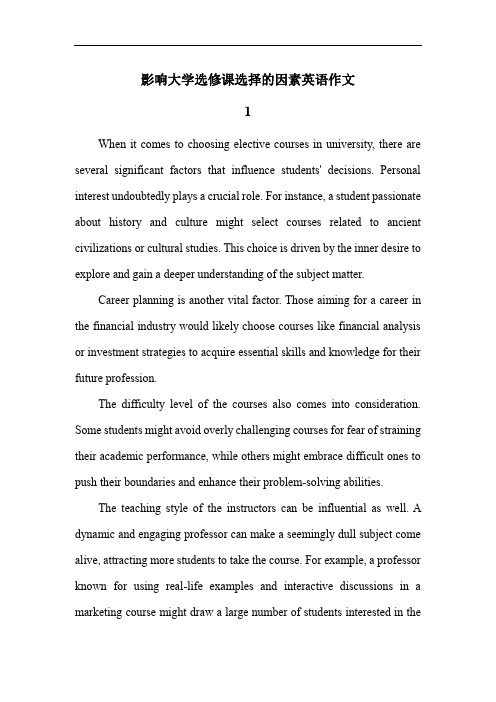
影响大学选修课选择的因素英语作文1When it comes to choosing elective courses in university, there are several significant factors that influence students' decisions. Personal interest undoubtedly plays a crucial role. For instance, a student passionate about history and culture might select courses related to ancient civilizations or cultural studies. This choice is driven by the inner desire to explore and gain a deeper understanding of the subject matter.Career planning is another vital factor. Those aiming for a career in the financial industry would likely choose courses like financial analysis or investment strategies to acquire essential skills and knowledge for their future profession.The difficulty level of the courses also comes into consideration. Some students might avoid overly challenging courses for fear of straining their academic performance, while others might embrace difficult ones to push their boundaries and enhance their problem-solving abilities.The teaching style of the instructors can be influential as well. A dynamic and engaging professor can make a seemingly dull subject come alive, attracting more students to take the course. For example, a professor known for using real-life examples and interactive discussions in a marketing course might draw a large number of students interested in thefield.In conclusion, the choice of university elective courses is a complex decision that involves multiple factors, and each student weighs these factors differently based on their individual goals and preferences.2When it comes to choosing elective courses in university, several significant factors come into play and interact with each other. One of the crucial elements is personal interest. Students are more likely to engage actively and perform well in courses that pique their curiosity and passion. For instance, a student who has a deep love for history might opt for a course on ancient civilizations.The teaching style of the instructor also holds considerable weight. A dynamic and engaging professor can make the learning process enjoyable and stimulating. Take the example of a language course where the teacher uses innovative teaching methods and creates a lively classroom atmosphere, attracting numerous students to choose it.The complementarity to one's major is another important factor. Some students select courses that enhance their knowledge and skills related to their main field of study. A computer science major might choose a course in artificial intelligence to broaden their expertise.Furthermore, the practical application and future career benefits of the course play a role. A student aiming for a career in business might choosecourses in marketing or finance to gain an edge in the job market.In conclusion, the choice of university elective courses is a complex decision influenced by a combination of factors, including personal interest, teaching style, complementarity to the major, and career prospects. Each student weighs these factors differently based on their individual goals and aspirations.3When it comes to choosing elective courses in university, several key factors come into play and have a significant impact on an individual's development. Firstly, personal interests undoubtedly play a crucial role. For instance, a student passionate about history might choose courses related to ancient civilizations to deepen their knowledge and satisfy their curiosity. Another important factor is career planning. Those aiming for a career in finance may opt for courses in economics or investment to build a solid foundation. Moreover, the desire to broaden one's knowledge base often influences the choice. Some students select interdisciplinary courses like psychology and sociology to gain a more comprehensive understanding of the world. To improve communication skills, choosing speech or debate courses is a common option. For example, a shy student might take a public speaking course to overcome their fear and enhance their ability to express themselves effectively. Additionally, the reputation and teaching quality of the instructor can be decisive. A highly respectedprofessor known for their engaging teaching style can attract many students to a particular elective. In conclusion, the choice of university elective courses is a complex decision that involves various factors, all of which contribute to shaping a student's academic and personal growth.4When it comes to choosing elective courses in university, several factors come into play. Firstly, personal interests play a crucial role. For instance, a student passionate about art might opt for courses like "History of Western Art" or "Modern Painting Techniques". Such choices not only enrich their knowledge but also allow them to pursue their hobbies.Another significant factor is the practicality of the course. Courses that offer practical skills and knowledge, such as "Financial Management" or "Computer Programming", are often favored as they enhance employability and provide useful tools for future careers.The requirement for credits also influences the decision. Sometimes, students may select relatively easy courses just to fulfill the credit requirements, like "Introduction to Literature" or "General Psychology". However, this might not always lead to the acquisition of substantial knowledge.Furthermore, the reputation and teaching quality of the instructor can be a determining factor. If a professor is known for their engaging teaching style and in-depth expertise, their courses tend to attract more students.In conclusion, the choice of university elective courses is a complex decision that involves a combination of personal interests, practical needs, credit requirements, and the quality of instruction. Students should carefully weigh these factors to make a choice that is both beneficial and enjoyable.5When it comes to choosing elective courses in university, there are numerous factors at play, both on a macroscopic and microscopic scale. From a macroscopic perspective, the trend of employment in society significantly influences the popularity of certain specialized elective courses. For instance, in an era dominated by digital technology, courses related to computer science and artificial intelligence have become highly sought-after as they offer better career prospects in the job market.On a microscopic level, an individual's personality traits and interests often determine their preferences for courses. A student with an outgoing and sociable personality might be inclined towards courses such as public speaking or communication skills, while a more introverted and detail-oriented student might favor courses in literature analysis or research methodology.Moreover, personal goals and future career plans also play a crucial role. If a student aspires to pursue a career in international business, they might choose courses in foreign languages and cross-culturalcommunication. Another factor could be the reputation and teaching quality of the instructors. A renowned professor known for their expertise and engaging teaching style can attract a large number of students to their elective courses.In conclusion, the choice of university elective courses is a complex decision that is influenced by a combination of external societal factors and internal personal characteristics and aspirations.。
大学选修课英语作文

大学选修课英语作文In the realm of higher education, elective courses play a pivotal role in shaping the holistic development of college students. These courses, though not part of the core curriculum, offer a wealth of opportunities for students to explore diverse fields, refine their interests, and enhance their skill sets. This essay delves into the multifaceted impact of elective courses on college students' personal development.Firstly, elective courses provide a platform for students to venture beyond their major subjects and gain a broader educational experience. By choosing electives that align with their passions or curiosity, students can acquire knowledgein areas such as art, music, literature, or foreign languages, which can be both intellectually stimulating and personally enriching.Secondly, the flexibility of elective courses allows students to customize their academic journey. They can select courses that complement their primary field of study, therebycreating a more interdisciplinary approach to learning. This not only broadens their understanding of various subjects but also equips them with a diverse set of skills that are highly valued in the modern workforce.Moreover, elective courses often foster critical thinking and problem-solving abilities. Many electives are designed tochallenge students to think creatively and independently, encouraging them to analyze complex issues and develop innovative solutions. This skill set is crucial for personal and professional success in an increasingly complex world.Another significant impact of elective courses is the promotion of personal interests and hobbies. Engaging in subjects that genuinely interest students can lead to adeeper sense of fulfillment and happiness. It can also helpin the discovery of hidden talents or the development of new hobbies that can be pursued throughout life.Furthermore, elective courses can enhance social and networking opportunities. Classes that are not confined to a student's major can attract a diverse group of peers, leading to a richer social environment. Interacting with studentsfrom different disciplines can foster a more inclusive and collaborative learning experience.Lastly, the pursuit of elective courses can contribute to the development of time management and self-discipline skills. Balancing the workload from major courses with the additional demands of electives requires effective organization and commitment. These skills are invaluable for personal development and are often transferable to other areas of life.In conclusion, elective courses are an integral part of the college experience, offering students the chance to explore new subjects, develop a well-rounded skill set, and enhance their personal interests. They provide a unique opportunityfor self-discovery and personal growth, ultimately preparing students for the multifaceted challenges of the future.。
talking about course selection -回复
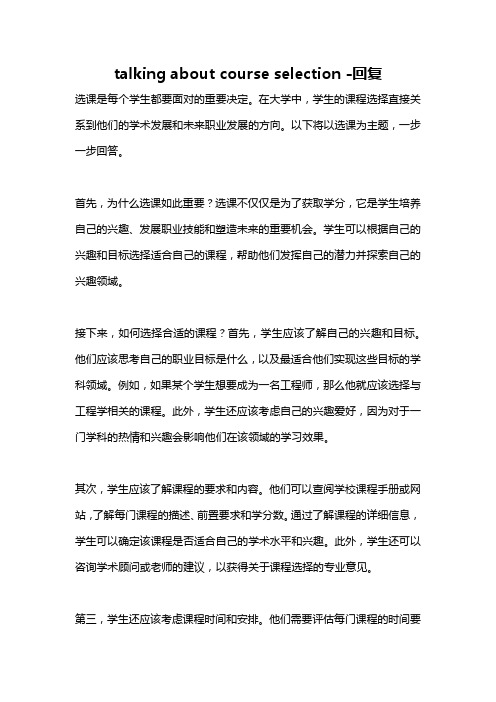
talking about course selection -回复选课是每个学生都要面对的重要决定。
在大学中,学生的课程选择直接关系到他们的学术发展和未来职业发展的方向。
以下将以选课为主题,一步一步回答。
首先,为什么选课如此重要?选课不仅仅是为了获取学分,它是学生培养自己的兴趣、发展职业技能和塑造未来的重要机会。
学生可以根据自己的兴趣和目标选择适合自己的课程,帮助他们发挥自己的潜力并探索自己的兴趣领域。
接下来,如何选择合适的课程?首先,学生应该了解自己的兴趣和目标。
他们应该思考自己的职业目标是什么,以及最适合他们实现这些目标的学科领域。
例如,如果某个学生想要成为一名工程师,那么他就应该选择与工程学相关的课程。
此外,学生还应该考虑自己的兴趣爱好,因为对于一门学科的热情和兴趣会影响他们在该领域的学习效果。
其次,学生应该了解课程的要求和内容。
他们可以查阅学校课程手册或网站,了解每门课程的描述、前置要求和学分数。
通过了解课程的详细信息,学生可以确定该课程是否适合自己的学术水平和兴趣。
此外,学生还可以咨询学术顾问或老师的建议,以获得关于课程选择的专业意见。
第三,学生还应该考虑课程时间和安排。
他们需要评估每门课程的时间要求和学习压力。
某些课程可能需要更多的课堂时间和学习时间,而某些课程可能相对较轻松。
学生应该计划好自己的课程时间表,确保他们有足够的时间来完成每门课程的学习和作业。
此外,学生还可以考虑选择一些跨学科的课程。
这些课程可以提供不同学科领域的知识和技能,帮助学生培养综合思维和解决问题的能力。
跨学科的课程还可以打开学生的眼界,使他们能够更好地理解和应对世界上的复杂问题。
最后,学生还应该考虑参加实习或实践课程。
这些课程可以提供学生实践经验和职业技能的机会。
通过参加实习或实践课程,学生可以将所学的知识应用到实际问题中,并与专业人士互动。
这不仅可以帮助他们培养自信和实践能力,还可以增强他们在就业市场上的竞争力。
talking about course selection -回复
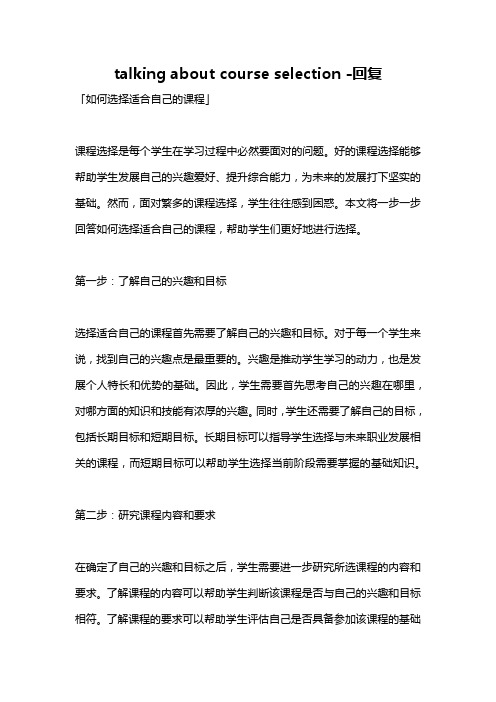
talking about course selection -回复「如何选择适合自己的课程」课程选择是每个学生在学习过程中必然要面对的问题。
好的课程选择能够帮助学生发展自己的兴趣爱好、提升综合能力,为未来的发展打下坚实的基础。
然而,面对繁多的课程选择,学生往往感到困惑。
本文将一步一步回答如何选择适合自己的课程,帮助学生们更好地进行选择。
第一步:了解自己的兴趣和目标选择适合自己的课程首先需要了解自己的兴趣和目标。
对于每一个学生来说,找到自己的兴趣点是最重要的。
兴趣是推动学生学习的动力,也是发展个人特长和优势的基础。
因此,学生需要首先思考自己的兴趣在哪里,对哪方面的知识和技能有浓厚的兴趣。
同时,学生还需要了解自己的目标,包括长期目标和短期目标。
长期目标可以指导学生选择与未来职业发展相关的课程,而短期目标可以帮助学生选择当前阶段需要掌握的基础知识。
第二步:研究课程内容和要求在确定了自己的兴趣和目标之后,学生需要进一步研究所选课程的内容和要求。
了解课程的内容可以帮助学生判断该课程是否与自己的兴趣和目标相符。
了解课程的要求可以帮助学生评估自己是否具备参加该课程的基础知识和技能。
如果课程内容与自己的兴趣相符,而且自己满足课程要求,那么这门课程就是适合自己的选择。
第三步:咨询老师和同学在做出最后的决定之前,学生可以咨询老师和同学的意见。
老师通常有丰富的教学经验,可以对不同课程的优缺点给予专业的评价。
同时,同学们也可能已经修过某些课程,可以分享自己的学习体验。
通过与老师和同学的交流,学生可以更全面地了解课程的特点和难度,从而做出更明智的选择。
第四步:制定合理的学习计划通过以上步骤,学生已经选择出适合自己的课程。
然而,仅仅选择课程是不够的,学生还需要制定合理的学习计划。
学习计划可以帮助学生安排好课程学习的时间和顺序,避免课程之间的冲突和重叠。
同时,学习计划也能够帮助学生合理安排复习和作业的时间,以提高学习效率和成绩。
talking about course selection -回复
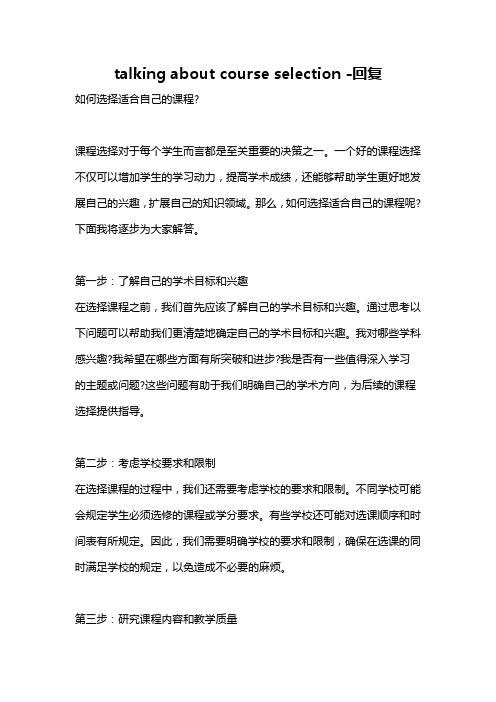
talking about course selection -回复如何选择适合自己的课程?课程选择对于每个学生而言都是至关重要的决策之一。
一个好的课程选择不仅可以增加学生的学习动力,提高学术成绩,还能够帮助学生更好地发展自己的兴趣,扩展自己的知识领域。
那么,如何选择适合自己的课程呢?下面我将逐步为大家解答。
第一步:了解自己的学术目标和兴趣在选择课程之前,我们首先应该了解自己的学术目标和兴趣。
通过思考以下问题可以帮助我们更清楚地确定自己的学术目标和兴趣。
我对哪些学科感兴趣?我希望在哪些方面有所突破和进步?我是否有一些值得深入学习的主题或问题?这些问题有助于我们明确自己的学术方向,为后续的课程选择提供指导。
第二步:考虑学校要求和限制在选择课程的过程中,我们还需要考虑学校的要求和限制。
不同学校可能会规定学生必须选修的课程或学分要求。
有些学校还可能对选课顺序和时间表有所规定。
因此,我们需要明确学校的要求和限制,确保在选课的同时满足学校的规定,以免造成不必要的麻烦。
第三步:研究课程内容和教学质量在选择课程时,我们需要仔细研究课程的内容和教学质量。
我们可以通过查阅学校课程手册、教师评估和同学的评价等途径了解课程的具体内容和教学质量。
我们应该选择那些与自己的学术目标和兴趣相符合的课程,同时注重课程的教学质量,确保能够获得良好的学习体验和学术提升。
第四步:咨询学术辅导员或教师意见在选择课程时,我们也可以咨询学术辅导员或教师的意见。
学术辅导员可以根据学生的学术方向和兴趣,为学生提供专业的指导和建议。
教师则可以根据自己的教学经验和了解,向学生推荐适合的课程。
他们的意见和建议可以帮助我们更全面地了解课程,做出更明智的选择。
第五步:平衡课程负荷和学术压力在选择课程时,我们应该考虑自己的学习能力和时间安排。
我们需要平衡课程负荷和学术压力,确保能够合理安排学习时间,保持良好的学习状态。
选择适合自己的课程,不仅要顾及学术需求,还要考虑到自己的实际情况,避免过度负荷和不必要的压力。
选课作文英语
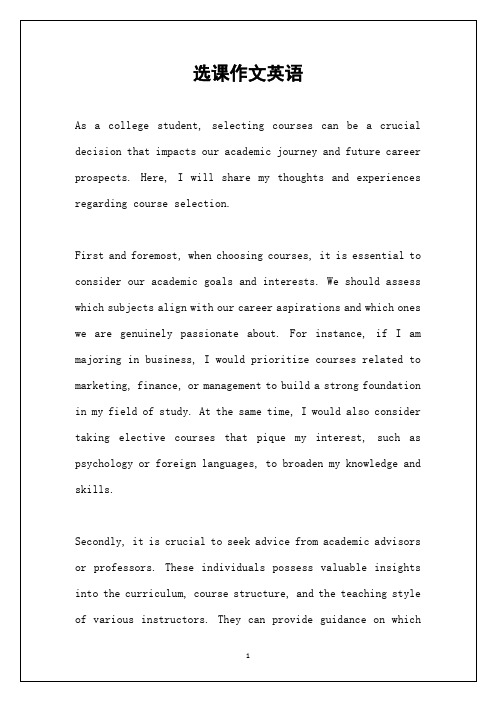
First and foremost, when choosing courses, it is essential to consider our academic goals and interests. We should assess which subjects align with our career aspirations and which ones we are genuinely passionate about. For instance, if I am majoring in business, I would prioritize courses related to marketing, finance, or management to build a strong foundation in my field of study. At the same time, I would also consider taking elective courses that pique my interest, such as psychology or foreign languages, to broaden my knowledge and skills.
关于入学的英语口语
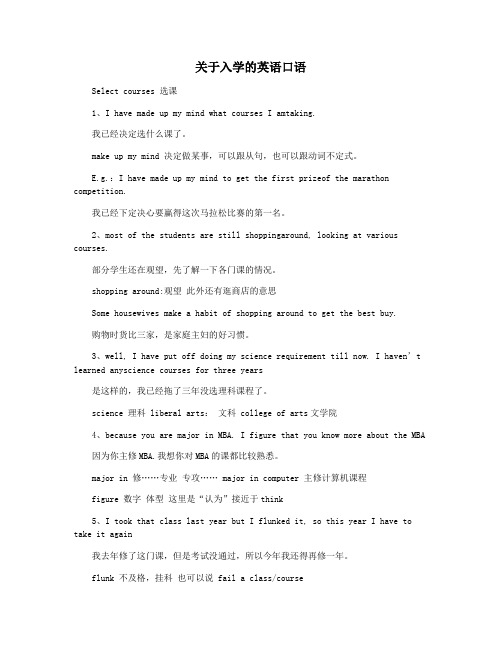
关于入学的英语口语Select courses 选课1、I have made up my mind what courses I amtaking.我已经决定选什么课了。
make up my mind 决定做某事,可以跟从句,也可以跟动词不定式。
E.g.:I have made up my mind to get the first prizeof the marathon competition.我已经下定决心要赢得这次马拉松比赛的第一名。
2、most of the students are still shoppingaround, looking at various courses.部分学生还在观望,先了解一下各门课的情况。
shopping around:观望此外还有逛商店的意思Some housewives make a habit of shopping around to get the best buy.购物时货比三家,是家庭主妇的好习惯。
3、well, I have put off doing my science requirement till now. I haven’t learned anyscience courses for three years是这样的,我已经拖了三年没选理科课程了。
science 理科 liberal arts:文科 college of arts文学院4、because you are major in MBA. I figure that you know more about the MBA因为你主修MBA.我想你对MBA的课都比较熟悉。
major in 修……专业专攻…… major in computer 主修计算机课程figure 数字体型这里是“认为”接近于think5、I took that class last year but I flunked it, so this year I have to take it again我去年修了这门课,但是考试没通过,所以今年我还得再修一年。
- 1、下载文档前请自行甄别文档内容的完整性,平台不提供额外的编辑、内容补充、找答案等附加服务。
- 2、"仅部分预览"的文档,不可在线预览部分如存在完整性等问题,可反馈申请退款(可完整预览的文档不适用该条件!)。
- 3、如文档侵犯您的权益,请联系客服反馈,我们会尽快为您处理(人工客服工作时间:9:00-18:30)。
校园口语第二课:Select courses
导读:本文校园口语第二课:Select courses,仅供参考,如果觉得很不错,欢迎点评和分享。
1、I have made up my mind what courses I am taking.
我已经决定选什么课了。
make up my mind 决定做某事,可以跟从句,也可以跟动词不定式。
E.g.:I have made up my mind to get the first prize of the marathon competition.
我已经下定决心要赢得这次马拉松比赛的第一名。
2、most of the students are still shopping around, looking at various courses.
部分学生还在观望,先了解一下各门课的情况。
shopping around:观望此外还有逛商店的意思
Some housewives make a habit of shopping around to get the best buy.
购物时货比三家,是家庭主妇的好习惯。
3、well, I have put off doing my science requirement till now. I haven’t learned any science courses for three years
是这样的,我已经拖了三年没选理科课程了。
science 理科liberal arts:文科college of arts文学院
4、because you are major in MBA. I figure that you know more about the MBA 因为你主修MBA.我想你对MBA的课都比较熟悉。
major in 修……专业专攻……major in computer 主修计算机课程
figure 数字体型这里是“认为”接近于think
5、I took that class last year but I flunked it, so this year I have to take it again
我去年修了这门课,但是考试没通过,所以今年我还得再修一年。
flunk 不及格,挂科也可以说fail a class/course
retake:重修
I failed this class last semester, so I have to retake it.
我上学期没通过这门课的考试,我要重修这门课
6、There are final exams and the students, if they pass, are given three full credits for these subjects
期末会有考试,如果学生通过了考试,他们会得到三门课的全部的学分Credit:学分two-credit course 两学分的课程
Credit system:学分制
7、conversation
Lihue: I’m coming to see you about selecting courses.
我来是为了选课的事情
Professor: yep. What are you thinking about then?
好的,你是怎么想的呢?
Lihue: I am planning to do three elective courses besides the three required ones
我打算选三门必修课和三门选修课。
Professor: how many credits in all?
总共多少学分?。
